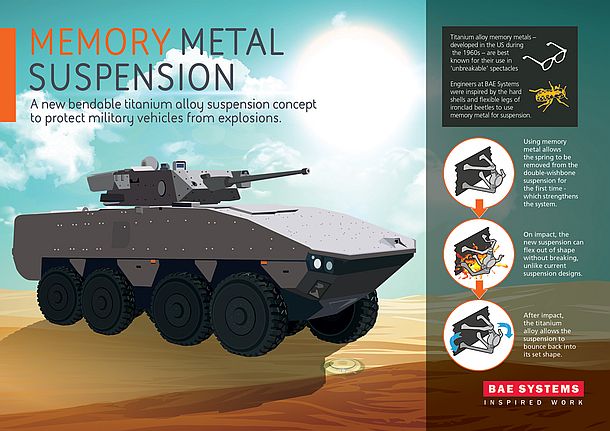A bendable titanium alloy suspension system inspired by the hard shells and flexible legs of ironclad beetles could hold the key to protecting future military vehicles from explosive impacts.
The alloy is made from the same type of material used in flexible spectacles and allows the suspension to ‘bounce back’ into shape after impact, so that the vehicle can continue its mission. Initial tests of a prototype have proved successful and engineers at BAE Systems in Shropshire, UK believe that the new suspension system could be made available in the next decade.
Currently, the hulls of combat vehicles and their passengers are protected from blasts such as mines or IEDs, but key operational parts such as the vehicle’s suspension can still be damaged – meaning they must be rescued by other military units. The memory metal alloy was first developed by the US Naval Ordnance Laboratory in the 1960s, but engineers at BAE Systems believe this is the first time it has been used to build an entire suspension system. Using memory metal also means the spring can be removed entirely from the suspension – strengthening and simplifying the system further.
 The suspension system explained. Click here to view the larger version. Credit: BAE Systems.
The suspension system explained. Click here to view the larger version. Credit: BAE Systems.
A prototype of the suspension system has already been constructed and tested by a team of experts and apprentices at BAE Systems as part of their response to a competition placed by the Government’s Defence, Science and Technology Laboratory for an unmanned Highly Robust Ground Platform. The small-scale prototype underwent five increasingly powerful explosive tests, showing significant resilience against the blasts as a result of its highly robust construction.
Now, the Company’s engineers are investigating adapting memory metal suspension for full-size combat vehicles, meaning that bendable titanium alloys could form a part of military operations within the next 10 years.
“This unique use of memory metals could prove a real game-changer for combat vehicles taking part in operations,” head of Mobility at BAE Systems Land (UK) Marcus Potter said. Being able to adapt to changing situations is hugely important to maintaining effectiveness, and this application of bendable titanium could give armed forces the required flexibility – and survivability – to complete tasks in challenging areas.”
The concept of using memory metals for suspension was developed after BAE Systems engineers reviewed a range of innovations in other high technology sectors and considered how they could be applied to combat vehicles.


